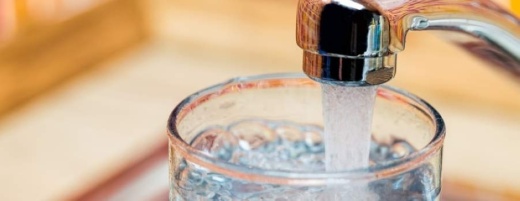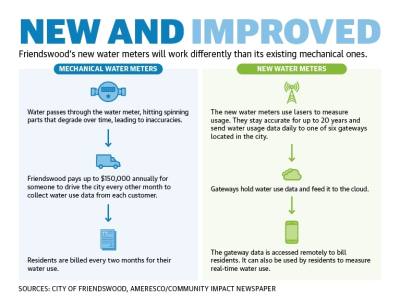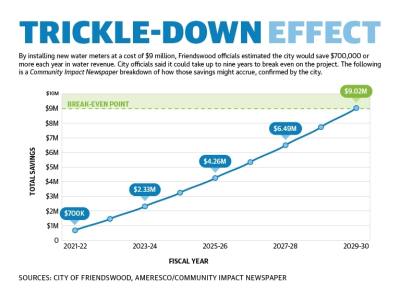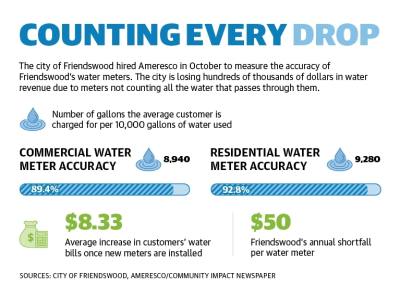The task is to replace each of the city’s more than 14,000 water meters, which are slowly becoming more inaccurate, with new ones capable of staying more accurate for longer. Officials said they expect the project will take about a year to complete.
“Unfortunately, for us to replace our entire 14,000-plus meters is a major upheaval,” Kabiri said.
Over time, Friendswood’s existing water meters, some of which are 25 years old, have begun malfunctioning, resulting in them not accurately counting how much water customers use. This has affected Friendswood’s bottom line, and replacing the water meters is one way to address the issue without raising water rates.
As a result, residents may notice higher water bills once the outdated meters are replaced.
“We’re losing $700,000 a year over 14,000 meters,” Mayor Mike Foreman said. “That’s $50 a meter we’re losing [annually].”
Correcting a problem
Friendswood leaders have known for years its water meters are inaccurate, but they found out just how much this summer.
The city hired Ameresco, a water conservation project company, to assess the city’s meters and eventually replace them. Ameresco’s sample showed the city’s residential water meters are 92.8% accurate on average, which means a resident who uses 10,000 gallons of water will be billed for only 9,280 gallons, on average.
“So basically, the customer is getting free water, and the city is still having to pay for all ... the water,” Ameresco Senior Account Executive Chad Nobles said.
While the meters are inaccurate, they are never inaccurate in the city’s favor.
“They don’t ever record more water passing through,” Foreman said. “They record less of the water, basically.”
Meanwhile, commercial water meters are even worse with an average accuracy of 89.4%, according to Ameresco.
“It could be a lot worse,” Nobles said.
Nobels has seen some cities with average commercial water meter accuracy as low as 30%, he said.
“Water meters fundamentally, especially ones that operate mechanically, have a fatal flaw in them,” Kabiri said, referring to the spinning part inside water meters that slowly corrodes over time, leading to inaccuracies. “They’re all presumed to be inaccurate to some degree.”
Friendswood gets its water from Houston water plants and thus pays Houston for the water Friendswood customers use. The goal is to collect as much water revenue from Friendswood customers as the city pays to Houston for the water, but in recent years, that has not been happening, according to city water data.
In fiscal year 2016-17, Friendswood collected $6.61 million in water revenue from users compared to the $6.79 million it paid Houston, which is a difference of about $180,000.
However, as more meters have degraded, the problem has gotten worse: In FY 2019-20, Friendswood collected $8.16 million and paid Houston $9.19 million, which is a difference of over $1 million, according to city data.
According to city officials, they can either fix the meters or raise water rates, but making sure everyone has an accurate meter is the most equitable way to solve the problem because those with accurate meters are paying more than those with inaccurate ones, Kabiri said.
“They’re subsidizing the folks that have older meters and are not registering correctly,” he said.
It will take the city an estimated eight or nine years to break even on the $9 million projct. Once all meters are installed, the city will save an estimated $1 million on average annually in revenue it otherwise would have lost due to inaccurate meters.
“These [new] meters are 99% accurate, and they maintain that accuracy for a 20-year period,” Kabiri said.
New-meter effects
Once the project begins this fall, Ameresco workers will go door to door to replace meters. Each replacement will take 10 to 30 minutes, but with 14,000 meters across the city, the project will not be complete until about November 2022, Nobles said.
Customers do not have the choice to keep their old meter, Kabiri said.
Once the new meters are in place, some customers might notice higher water bills. Today, there is about a $700,000 annual difference between how much the city collects in water revenue versus what it is costing the city. That means customers will spend $50 more on average annually for water, Foreman said.
This number could be higher or lower depending on how inaccurate a customer’s old meter was.
“Most people are not going to notice,” Foreman said.
However, the new water meters may allow residents to save money as well, officials said.
The new water meters will be able to provide residents real-time water use data, which will allow residents to check and monitor their water usage to target a specific amount, potentially lowering how much water they use and their bills, officials said.
Additionally, residents will be able to set up text alerts at different thresholds of water use. This will warn customers when they are using more water than they want or warn them of a potential leak if they notice water use while they are away from home, officials said.
Nobels said some residents in other Texas cities where smart meters have been installed expressed gratitude for the ability to track their water use, especially during the freezing weather in February. Residents were able to determine whether their pipes had burst by tracking their water use, Nobels said.
“There’s a lot of different uses for these ... smart meter systems,” he said. “These systems can be used in a lot of different ways.”
The new meters come with other cost-saving advantages. For instance, the city will not have to pay a company $150,000 annually to drive around to collect water meter data, Kabiri said; the city will be able to read that data remotely.
Cost breakdown
Debt the city issued in 2019 will pay for the $9 million project. No property tax dollars will be used, Kabiri said.
Additionally, Friendswood charges residents only what it costs to buy water from Houston, not more, he said.
“We’re not in a profit-making business,” Kabiri said. “It’s a zero-sum game.”
Still, officials believe the project is worth the cost, even if it takes nearly a decade for the city to save enough in water revenue it otherwise would have lost to make up the $9 million.
Friendswood City Council Member John Scott was the only council member to vote against the $9 million contract July 12. As a business owner, Scott said a project is not worth the price if it cannot pay for itself within two or three years.
“Quite simply, the return on investment is not there. I think the cost is too high. I think the payback is too long,” he said. “That’s a problem for me.”
Foreman said the city should be more concerned about the consequences of not replacing the meters rather than the city’s return on investment; the problem would get worse.
Scott said the city should continue doing what it has been: let the inaccurate meters remain and audit them more frequently.
“Unless you can present a solution that is cost effective, I’m not going to support it,” he said.








